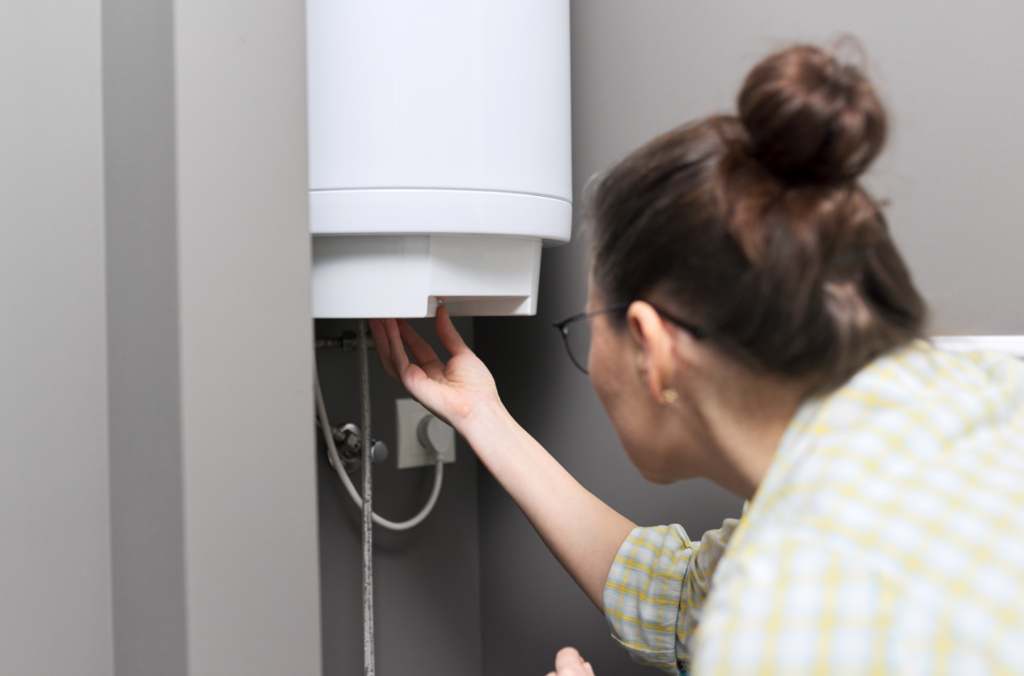5 Reasons Tankless Water Heaters Are a Game Changer for Energy Efficiency
 When it comes to home appliances, heating and cooling systems often take center stage due to their significant impact on comfort and energy efficiency.
When it comes to home appliances, heating and cooling systems often take center stage due to their significant impact on comfort and energy efficiency.
However, there’s another hero in the realm of energy efficiency and comfort – tankless water heaters.
These innovative devices have been rising in popularity for several reasons, particularly their ability to save energy and, in turn, reduce utility costs.
Understanding Tankless Water Heaters
Tankless water heaters, also known as on-demand water heaters, operate by instantly heating water as it flows through the device, rather than storing hot water in a tank for later use.
This method eliminates the need for a large storage tank and the energy losses associated with keeping a volume of water heated at all times.
By heating water only when it’s needed, tankless water heaters significantly reduce the standby energy losses that are common with traditional tank-style heaters, leading to notable improvements in overall energy efficiency.
From saving space to reducing your carbon footprint, the advantages of switching to a tankless water heater are clear.
Here’s why you should consider making the change.
1. Substantial Energy Savings
One of the most significant benefits of tankless water heaters is their potential for energy savings.
Traditional water heaters must keep a large tank of water hot at all times, even when no one needs hot water.
This can account for a significant portion of your home’s energy usage.
In contrast, tankless water heaters heat water only when there is a demand, which can reduce energy consumption by 24% to 34% in homes that use 41 gallons or less of hot water daily.
For larger homes, the savings may still be considerable, especially if you choose to install more than one tankless unit to supply different areas of the home.
2. Continuous Hot Water Supply
Tankless water heaters provide an endless supply of hot water, which can be a game-changer in homes that frequently run out of hot water due to high demand.
This feature is particularly advantageous for larger households and families with multiple bathrooms, allowing everyone to shower or use hot water without worrying about the supply running dry.
It’s also a godsend for those who love to take long, hot showers without the nagging guilt of energy wastage.
3. Longevity and Ease of Maintenance
The typical lifespan of a tankless water heater is approximately 20 years, nearly double that of a traditional water heater.
By comparison, tanks are likely to last anywhere from 10 to 15 years, depending on the maintenance and water quality.
Furthermore, tankless units are less prone to leakage and corrosion, given that there is no standing water in a tank to cause damage and rust.
Maintenance is also simpler since there is no tank to flush, although it’s still essential to descale and perform regular service to keep the unit running optimally.
4. Reduced Risk of Water Damage
A significant concern for homeowners with traditional water heaters is the potential for leaks, which can cause substantial water damage and the growth of mold if not addressed promptly.
Since tankless water heaters don’t store water, the risk of catastrophic water damage due to a leak is minimal.
While tankless units can still leak, the water volume is significantly lower, and many units are equipped with shut-off valves designed to stop the flow of water in the event of a leak, mitigating the risk further.
5. Space-Saving and Aesthetic Benefits
For homeowners with limited space, whether in a small apartment or a strategically designed minimalistic house, the space-saving design of tankless water heaters offers a significant advantage.
Traditional water heaters typically require a large, dedicated space for installation, while tankless units can be mounted on a wall, inside a closet, or even under a sink.
This flexibility not only frees up square footage but also allows for a cleaner, less cluttered aesthetic within your living space.
Bonus Benefit: Environmental Impact
In addition to the tangible benefits for your home and wallet, tankless water heaters also have a positive impact on the environment.
By reducing your home’s energy consumption, you’ll be lowering your carbon footprint and contributing to the preservation of our planet’s resources.
If every household were to switch to a tankless water heater, the collective energy savings would be substantial and indicative of a significant reduction in global energy use.
Finding the Right Tankless Water Heater for Your Home
To reap the full benefits of a tankless water heater, it’s crucial to select a unit that is appropriately sized for your household’s hot water needs.
Consulting with a professional HVAC service such as McQuade Heating & Cooling Plumbing & Refrigeration can help you determine the right size and model for your home.
Consider factors such as the flow rate (in gallons per minute) required by the number and types of hot water appliances used simultaneously and the temperature rise your unit will need to provide, based on where you live.
By making an informed decision and choosing the right unit, you can ensure that your transition to a tankless water heater is smooth, efficient, and beneficial for years to come.
In conclusion, while the initial cost of a tankless water heater may be higher than that of a traditional unit, the long-term savings, and the various other advantages make it a worthwhile investment for many homeowners.
Take these reasons into account and see if a tankless water heater is the right step for your home’s energy efficiency and your personal comfort.
With each hot water tap, you could be feeling the warmth of both your new unit and the knowledge that you’re taking practical steps towards improving energy use in your household.
Category: Housing




